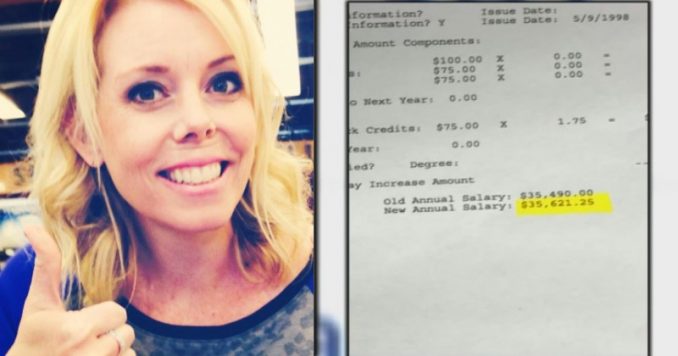We’ve seen teacher strikes across our country, time and again, as our educators demand more pay. When one teacher decided to join in the debate, she posted her pay stub, revealing her salary online. And, it caused quite the uproar.

Elisabeth Coate Milich did something most people won’t do. In a country where we don’t typically talk about our finances and earnings in public, the Arizona school teacher decided to post her pay stub on social media for the world to see because she wanted to make a point about the pay teachers receive.
Milich wanted to show that, despite all the schooling that is required to become a teacher, she and her colleagues don’t make a living wage. Although it was removed because of all the negative feedback she received, Milich’s Facebook post showed that she only received a $131 raise in a year as her salary went from $35,490 to $35,621, according to TODAY.
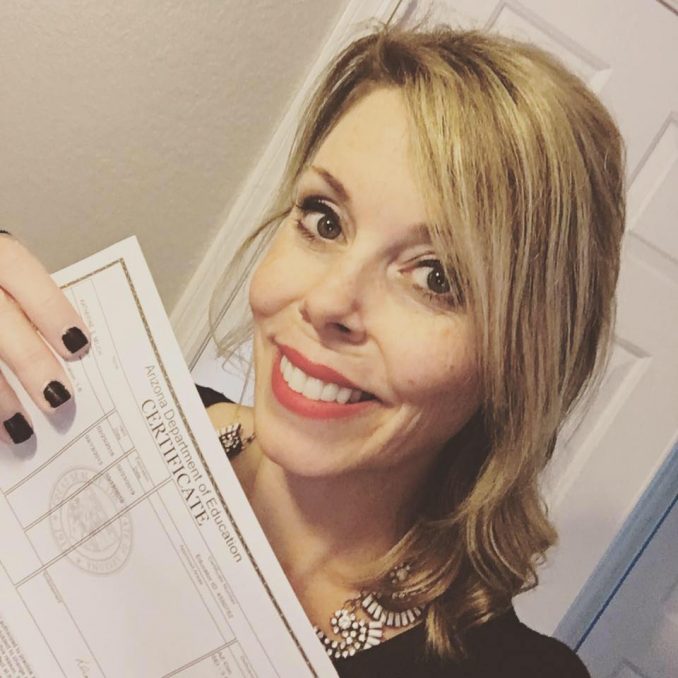
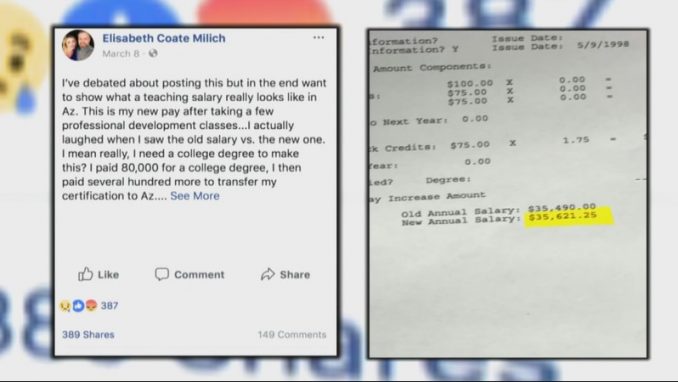
“I actually laughed when I saw the old salary versus the new one,” Milich wrote in her post. “I need a college degree to make this? I know I don’t make a lot of money, but then when I see it in black and white I’m like ‘wow!’ I mean, I love teaching, absolutely love it, but when you see what the salary is, you cannot live on it.”
Milich, who has been in education for years and is currently a second-grade teacher at Whispering Wind Academy in Phoenix, says she debated over whether or not to post her paycheck, according to CBS News. In the end, she decided that she wanted to show what a teaching salary really looks like in her state, but Milich’s picture is bleaker than most.

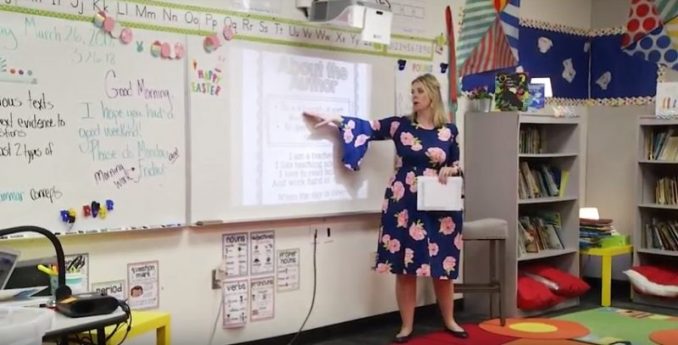
Although Arizona does have some of the lowest-paid public school teachers in the nation, the average salary for those educators is not the $35,621 that Milich’s check stub reflects. The average salary is instead $47,218, but compared to the national average of $58,353 a year, according to National Education Association Research, that’s still low.
While those numbers sound much better than the picture Milich’s photo painted, she made sure to point out that teachers are often left to pay for supplies for students like markers and tape without being compensated. She’s also still paying off her student loans, 20 years after graduating from college.


If it wasn’t for her husband’s salary, Milich says she’d be in bad shape, and she knows this because some of her fellow teachers aren’t so lucky as to have a second household income. “My teacher friends that I work with, they work three and four jobs to make ends meet,” Milich explained. “I know teachers that teach kindergarten all day long and then they leave and they go waitress at Applebee’s,” she added.
“If you are a single person trying to make it on what we make, you couldn’t do it,” she claimed, and studies seem to indicate she’s correct about teaching becoming an unsustainable profession. In fact, a 2017 study by the Arizona State University’s Morrison Institute for Public Policy said that teacher recruitment and retention levels in Arizona are at “crisis” levels. The study found that 42% of Arizona teachers who were hired in 2013 left the profession after three years and that the state’s elementary school teachers are the lowest paid in the country.
Of course, there’s another side to this argument. While teachers bemoan their salary, many people are quick to point out that these educators do not work anywhere near the same number of days as other full-time professionals, so they shouldn’t expect to receive the same full-time wages. But, are teachers really working less?
Profit of Education put together a table explaining how many days a year teachers put in on-the-clock compared to “professional and related” workers with 10 years experience, using data from the National Council on Teacher Quality (NCTQ). As you can see, teachers have nearly 50 fewer, more than 20% less, on-the-clock workdays than those in the private sector.
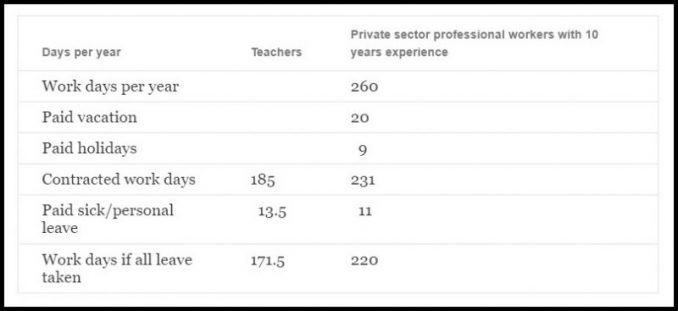
Of course, this doesn’t take into consideration the work teachers do “off-the-clock,” and there’s really no way to know how much time is spent working during their personal time. Those numbers would be self-reported and unverifiable, and they would also vary greatly by individual. Even so, if you factor in 20% more time off, a salary of nearly $60,000 (the actual national average), teaching and the compensation doesn’t sound quite as bad.
Then again, there are the supplies, but there’s another side to that debate as well. Many parents on various posts about Milich’s salary were quick to point out that parents bear a lot of that burden, buying copious supplies according to teachers’ very specific requests. So, once again, this would definitely vary on an individual basis. While some teachers may be spending significant amounts on their classroom, there are those who don’t spend much at all.

We bring you the info, you decide. Are our teachers underpaid or is the pay less because they work less on-the-clock hours than other full-time professions? Either way, I think there is one thing we can all agree on. The most essential careers to a safe, productive, and happy American society could never be paid enough money for what they do.
Firefighters, police officers, EMTs, nurses, military service members, and teachers, just to name a few, provide invaluable services to their communities. How do you fairly compensate such critical work? You simply can’t put a price tag on it. That’s why, for most people who choose these professions, it’s not about the salary anyway — they enter these fields for reasons money can’t buy, and we applaud them for it.


